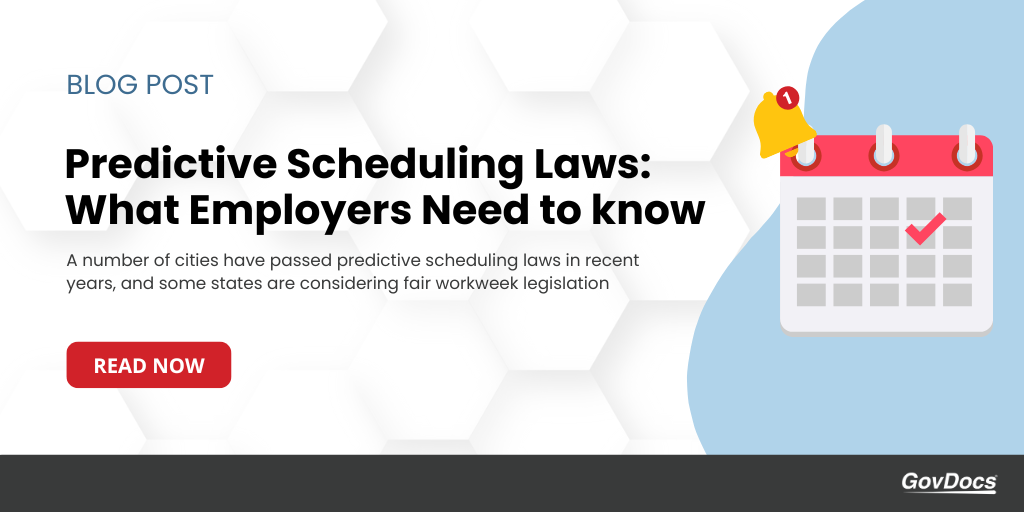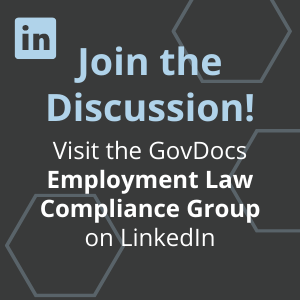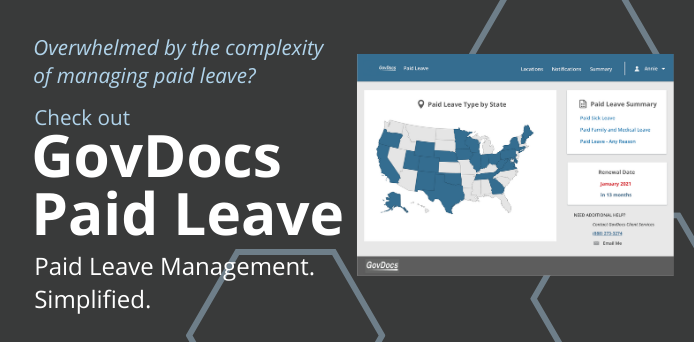EMPLOYMENT LAW NEWS
Predictive Scheduling Laws: What Employers Need to Know
By Kris Janisch
Updated March 2023

Increasingly, employers have to manage the intricacies of predictive scheduling, which is aimed at giving employees more work-life balance and requiring employers to provide work schedules ahead of time.
Do you know what “clopening” is?
It’s when an employee works the closing shift one day and the opening shift the next. And it’s not allowed under certain predictive scheduling laws unless an employee agrees to it.
Predictive scheduling has become more common over the past decade, with Oregon being the first (and so far only) state to pass such a measure in 2017. But even before that time, smaller jurisdictions enacted predictive scheduling laws, which can go by other names, such as fair workweek, for example.
Plus, a couple of major U.S. cities — Chicago and Philadelphia — have recently passed predictive scheduling laws.
Increasingly, employers have to manage the intricacies of predictive scheduling, which is aimed at giving employees more work-life balance and requiring employers to provide work schedules ahead of time.
However, there are additional requirements and nuances for employers to know about predictive scheduling across the jurisdictions that have them.
UPDATE: LA Predictive Scheduling Law
What is Predictive Scheduling?
 As a refresher, these laws mostly apply to businesses in the retail, food and hospitality industries. At a high level, predictive scheduling requires employers to post work schedules in advance, generally 14 days.
As a refresher, these laws mostly apply to businesses in the retail, food and hospitality industries. At a high level, predictive scheduling requires employers to post work schedules in advance, generally 14 days.
Some laws are more restrictive than others, with additional obligations for employers, including:
- Recordkeeping requirements
- Notifying employees of potential on-call shifts
- Allowing existing employees the opportunity to take on hours before an employer hires a new worker
- Penalties for last-minute schedule changes
- Telling new hires how many hours they can expect to work
Each jurisdiction handles predictive scheduling laws differently, adding yet another layer to the employment law compliance puzzle. (And they also require a related labor law posting.)
States with Predictive Scheduling Laws
Oregon was the first state to pass a predictive scheduling law. Unlike other employment law trends, other states have not followed suit, though New Hampshire and Vermont have less involved scheduling-related laws.
In Oregon, the predictive scheduling law applies to employers in the retail, hospitality and food industries with 500 or more employees worldwide. The law requires employers to:
- Provide schedules at least 14 days in advance, posted in a conspicuous place, including on-call shifts
- Pay employees a penalty for shift changes without notice, with various rates depending on the type of violation
- Allow employees to decline shifts not on the written schedule
- Allow employees to provide input on schedules
- Allow employees at least 10 hours between shifts on back-to-back days, unless approved by the worker, with the employee receiving time and a half if they are scheduled in that manner
While it’s just Oregon at this point, other states have considered predictive scheduling laws, including Connecticut, Illinois, Maine, Michigan, Minnesota, New Jersey, North Carolina and Rhode Island.
Lastly, employers should also know that smaller jurisdictions are barred from passing predictive scheduling laws in:
- Arkansas
- Georgia
- Iowa
- Tennessee
Cities with Predictive Scheduling Laws
Unlike predictive scheduling at the state level, there are several cities with such laws.
Chicago
Chicago’s Fair Workweek Ordinance applies to employers with 50-plus covered employees in seven covered industries:
- Building services
- Healthcare
- Hotels
- Manufacturing
- Restaurants
- Retail
- Warehouse service
Employees are covered if they make less than $26 an hour or $50,000 a year, and the employer has at least 100 employees globally (250 employees and 30 locations for a restaurant).
Employers must provide schedules 10 days in advance. The ordinance gives employees:
- The right to decline unscheduled hours
- Predictable pay and additional pay when hours are added or changed
- Pay for canceled hours and shifts – 50 percent of pay for the entire shift when done with less than 24 hours’ notice
- The right to decline shifts when scheduled within 10 hours of each other, or receive 1.25 times the rate of pay if they do work
- A good faith estimate of their work schedule from the employer
Also, employers must post schedules 14 days in advance starting in 2022. Find more information on Chicago’s FAQs page for the Fair Workweek Ordinance.
Emeryville, Calif.
Possibly taking the crown as the most employee-friendly city in the U.S., Emeryville, Calif., has a predictive scheduling law, which it calls the Fair Workweek Ordinance.
It applies to retail companies with 56 or more employees globally, and fast food businesses with 26 or more employees globally and 20 or more workers in Emeryville.
Under the Emeryville Fair Workweek Ordinance, employers must provide work schedules two weeks in advance, as well as:
- Provide initial estimates of an employee’s work schedule upon hire, including on-call shifts
- Provide compensation for schedule changes, which differs based on when the change is made
- Offer existing part-time employees additional work before hiring another employee
- Provide rest periods, defined as the first 11 hours after the end of the previous calendar day’s shift and the first 11 hours following the end of a shift that spanned two calendar days (if an employee does work, they receive time and a half)
The ordinance went into full effect, including enforcement and fines, in 2018.
New York
New York’s predictive scheduling law went into effect in 2017 and survived a legal challenge this spring.
Applying to larger retail and fast food employers, the city has different rules depending on the industry.
Retail
Under New York’s Fair Workweek Law, retail employers must:
- Provide workers with schedules 72 hours in advance
- Allow workers to decline last-minute shifts
- Not cancel a scheduled shift with less than 72 hours’ notice
- Not require an employee to work without 72 hours’ notice, unless they agree to it
Fast Food
For fast food employers in New York City, they must:
- Give workers regular schedules that stay the same week-to-week
- Give employees work schedules 14 days in advance of the start of the schedule
- Pay premiums for schedule changes or “clopenings”
- Give employees the opportunity to decline extra work or “clopenings”
- Give current employees the chance to work more regular hours before hiring new employees
Also, employers cannot fire or reduce the hours of a worker by more than 15 percent without just cause or a legitimate business reason, and employers must reinstate laid off employees by seniority when hours become available.
Finally, expanded protections against abrupt reductions in hours for fast food workers took effect July 4, 2021.
Philadelphia
The Philadelphia Fair Workweek Employment Standards Ordinance was initially set to go into effect Jan. 1, 2020, but was delayed until April 1 last year.
The ordinance applies to businesses in the retail, food and hospitality industries with 30 or more locations nationwide (including franchises and chains) and 250-plus employees, which includes part-timers.
In Philadelphia, the ordinance requires:
- 14-day advance notice of work schedules
- Estimates of average work schedules
- Telling employees about potential on-call hours
- “Prompt” notice of schedule changes
- Employees to be able to decline hours not part of the posted schedule
- A minimum of nine hours between shifts
- Existing employees to take hours before new hires are made
- Recordkeeping and posting obligations
Also, workers can request a schedule change without fear of retaliation. The ordinance does not cover independent contractors, and employees covered by a collective bargaining agreement may waive the requirements.
San Francisco
San Francisco’s predictive scheduling ordinance applies to all retail employers with at least 40 locations worldwide and 20 or more employees in San Francisco.
Also, an employer is considered a retail business if it maintains an array of merchandise, standardized décor and color scheme, uniform apparel, standardized signage, or a trademark. Because of this broad description, some food establishments may also qualify under the ordinance.
Employers must provide schedules two weeks in advance, as well as:
- Providing an initial estimate of an employee’s work schedule upon hire, including on-call shifts
- Compensating employees for schedule changes, differing depending on the amount of notice given
- Paying employees for being on call but not called into work, two hours of work for every shift of four hours or less, and four hours of pay for each shift of four hours or more
Meanwhile, employers must treat part- and full-time employees equally regarding wages, time off and promotion eligibility.
Find more information on San Francisco’s website.
Also, wrapping up California cities, San Jose’s predictive scheduling law is not as expansive as those in Emeryville and San Francisco, but it does require employers to offer additional work to current part-time workers before hiring another employee.
Seattle
In Seattle, the city’s Secure Scheduling Ordinance covers hourly employees at retail and food service establishments with 500 or more employees worldwide, as well as full-service restaurants that have 40 or more locations worldwide.
Requiring employers to post schedules (in English as well as employees’ primary languages) 14 days in advance, Seattle’s ordinance also says employers must:
- Provide a written good faith estimate of median hours to new hires and existing employees annually when significant changes may be made
- Allow employees to decline shifts not on the original schedule
- Allow employees to request schedule preferences based on major life events
- Offer additional hours to current employees before making a new hire (unless an exception applies)
- Pay time and a half for hours worked between closing and opening shifts if they are separated by fewer than 10 hours
- Pay the additional compensation for a employer-requested schedule change after the schedule is posted, with different rates depending on when it’s changed
Finally, employers must keep records for three years.
Jurisdictions That Have Considered Predictive Scheduling
Several jurisdictions have examined predictive scheduling laws. While some legislation has failed and others are pending, as a heads-up to employers, here is a list:
- Boston
- Los Angeles
- Minneapolis
- Washington, D.C.
- California
- Connecticut
- Hawaii
- Illinois
- Massachusetts
- Michigan
- New Jersey
- North Carolina
- West Virginia
Also, Bellingham, Wash., has a fair treatment of hourly/gig workers set to go before voters on the November 2021 ballot.
Conclusion
Summer is a particularly noteworthy time of year for predictive scheduling laws. Busy cafes and shops, and people out enjoying the weather, adds up to a need for more employees — and the compliance challenges that come with them.
As always, employers should research the employment laws that may impact their locations. It can be challenging to monitor all the updates, from labor law postings to minimum wage and paid leave, as well as pre-employment hiring regulations and more.
This Employment Law News blog is intended for market awareness only, it is not to be used for legal advice or counsel.
Keep Informed
with GovDocs Employment Law News
Learn More About GovDocs
What is GovDocs?
GovDocs is a leading provider of employment law compliance solutions, empowering HR professionals to navigate complex, location-specific labor law postings, minimum wage requirements, and paid leave laws. GovDocs combines innovative technology with dedicated human-touch support to deliver worry-free compliance. Customers benefit from access to a centralized system, trusted resources, and expert employment law support they need, all in one place, to simplify compliance and protect their organization from risk. Trusted by over 35% of Fortune 500 companies, GovDocs focuses on comprehensive coverage of Federal, State, City, and County laws making employment law management seamless for organizations of all sizes. Join the evolution of employment law compliance here!
Have fewer than 30 locations?
The GovDocs Poster Store simplifies posting compliance for employers with less than 30 locations across all industries, offering a variety of posting products to meet your labor law compliance needs.



